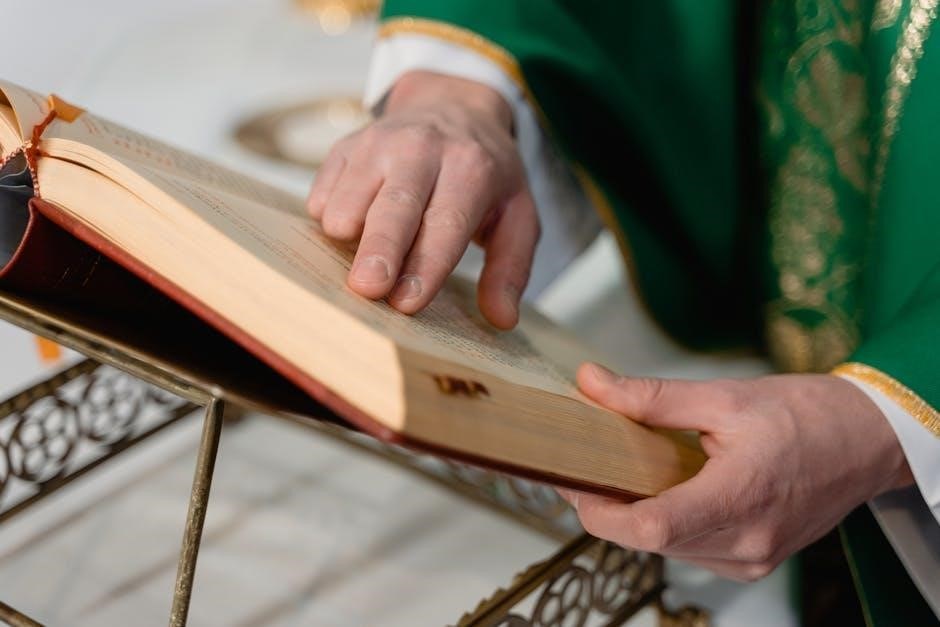Psalm 23 is a timeless source of comfort, offering reassurance of God’s care and trustworthiness․ Its themes of divine guidance resonate deeply in Christian worship․
1․1․ Overview of Psalm 23
Psalm 23, attributed to King David, is a profound expression of trust in God’s care․ It vividly portrays God as a shepherd, emphasizing divine guidance, provision, and protection․ The psalm’s six verses explore themes of trust, comfort, and the assurance of God’s presence in life’s challenges․ Its imagery-rich language, including green pastures, a restored soul, and a table spread before enemies, offers timeless encouragement․ This beloved psalm is widely used in worship, funerals, and personal devotion, resonating with believers across generations․ Its message of hope and divine faithfulness continues to inspire and comfort people in all seasons of life․
1․2․ Historical and Cultural Context
Psalm 23, attributed to King David, reflects his experiences as a shepherd and king in ancient Israel․ Written around 1000 BC, it captures the trust and dependence on God prevalent in Jewish culture․ The shepherd metaphor resonated deeply, as shepherding was a vital occupation, symbolizing care and protection․ The Psalm also mirrors the broader themes of trust and divine providence in the Hebrew Scriptures, offering comfort and hope to a nation navigating challenges․ Its enduring relevance stems from its universal appeal to human struggles and the timeless assurance of God’s presence․ This context enriches its meaning for modern readers today․
1․3․ The Significance of Psalm 23 in Christian Worship
Psalm 23 holds profound significance in Christian worship as a timeless expression of trust in God’s providence․ Often recited in liturgies, funerals, and times of crisis, it offers comfort and hope․ Its vivid imagery of the shepherd’s care resonates universally, transcending cultural and personal circumstances․ The psalm’s themes of divine guidance, provision, and protection strengthen believers’ faith, fostering intimacy with God․ Its inclusion in hymns, prayers, and sermons underscores its enduring relevance, making it a cornerstone of Christian devotion and a source of solace for generations․

The Structure of the Psalm
Psalm 23 consists of six verses, each offering a unique perspective on God’s care․ The structure flows from trust to triumph, reflecting life’s journey with divine guidance;
2․1․ Verse 1: “The Lord is my shepherd”
Psalm 23 begins with a profound declaration: “The Lord is my shepherd․” This verse establishes the central metaphor of the psalm, portraying God as a caring shepherd who guides and protects His people․ The imagery reflects ancient shepherding practices, where the shepherd ensures the flock’s safety, provides food, and leads them to rest․ By identifying God as “my shepherd,” the psalmist expresses personal trust and intimacy with Him․ This statement sets the tone for the rest of the psalm, emphasizing God’s faithfulness and the believer’s reliance on His care and provision․ It invites readers to reflect on their own relationship with God as their Shepherd․
2․2․ Verse 2: “He makes me lie down in green pastures”
The phrase “He makes me lie down in green pastures” highlights God’s provision and care․ Green pastures symbolize rest, abundance, and spiritual nourishment․ This verse emphasizes trust in God’s goodness, knowing He provides exactly what is needed․ It invites believers to surrender to His guidance, finding peace in His presence․ The imagery contrasts the chaos of life with the tranquility of divine provision, reassuring us that God leads us to places of refreshment and restoration․ This verse encourages gratitude for His faithfulness and provision, even in challenging times․
- Reflects God’s role as a caring Shepherd․
- Symbolizes spiritual rest and renewal․
- Encourages trust in God’s provision․
2․3․ Verse 3: “He restores my soul”
This verse highlights God’s role in spiritual renewal and healing․ The phrase “restores my soul” speaks to the rejuvenation of one’s inner being, addressing emotional and spiritual exhaustion․ It reflects the shepherd’s care in guiding and reviving the flock, ensuring their well-being․ For believers, this promise offers hope in times of discouragement, reminding us that God revives and strengthens us․ The restoration of the soul is not just a momentary relief but a profound transformation, enabling us to walk in peace and purpose․ This verse invites us to trust in God’s faithfulness to renew and refresh our lives continually․
2․4․ Verse 4: “Even though I walk through the darkest valley”
Verse 4 of Psalm 23, “Even though I walk through the darkest valley,” speaks to the inevitability of life’s challenges and the assurance of God’s presence․ The imagery evokes moments of deep struggle and fear, yet the psalmist declares unwavering trust in God․ The phrase “darkest valley” symbolizes life’s most daunting trials, where shadows of doubt and despair loom․ However, the verse emphasizes that even in such darkness, God’s comforting presence remains steadfast․ This truth offers profound encouragement, reminding believers that they are never alone, even in their most difficult journeys․ God’s guidance and care endure․
2․5․ Verse 5: “You prepare a table before me”
In the midst of life’s challenges, Psalm 23:5 reminds us of God’s extravagant provision and hospitality․ The table symbolizes abundance and celebration, even in the presence of enemies․ This verse highlights God’s generosity and desire to bless His people․ It invites believers to trust in His faithfulness, knowing He provides beyond basic needs․ The table also represents fellowship with God, emphasizing a relationship rooted in love and trust․ This imagery reassures us of His goodness, encouraging gratitude and reliance on His care, even in uncertain circumstances․
2․6․ Verse 6: “Surely your goodness and love will follow me”
This verse encapsulates the enduring promise of God’s faithfulness․ The phrase “goodness and love” reflects His unwavering care, ensuring believers are never without His presence․ The imagery suggests a divine pursuit, where God’s blessings and compassion chase after His people, offering comfort and assurance․ It invites trust, reminding us that even in life’s uncertainties, His love remains a constant companion․ This verse inspires gratitude and hope, reinforcing the idea that God’s faithfulness endures forever, providing strength for the journey ahead․

The Shepherd Metaphor
The Shepherd Metaphor in Psalm 23 beautifully portrays God’s nurturing and protective care, emphasizing trust and divine guidance in life’s journey․
3․1․ The Role of a Shepherd in Ancient Times
In ancient times, shepherds were vital caretakers, managing flocks with dedication and authority․ They led sheep to green pastures, protected them from predators, and ensured their well-being․ This role required immense responsibility, trust, and care․ The shepherd’s staff was a symbol of guidance and protection․ In Psalm 23, David uses this familiar metaphor to convey God’s nurturing and protective nature, emphasizing trust in His leadership and provision․ The shepherd’s care mirrored God’s divine love and faithfulness, offering comfort and assurance to believers․
3․2․ Jesus as the Good Shepherd

Jesus embodies the Good Shepherd, a figure deeply rooted in Psalm 23, offering guidance, protection, and unconditional love․ In John 10, Jesus declares Himself the Good Shepherd, willing to lay down His life for His sheep․ This imagery reflects His sacrificial love and commitment to His followers․ Unlike hirelings who abandon their flock, Jesus remains faithful, ensuring believers find eternal life and security in Him․ This profound metaphor assures believers of His unwavering care and presence, mirroring the comforting tone of Psalm 23․
3․3․ The Comfort of Divine Guidance
The shepherd metaphor in Psalm 23 offers profound comfort, assuring believers of God’s constant presence and guidance․ Just as a shepherd leads with care, God directs His people with wisdom and love․ This divine guidance brings peace, even in uncertain times, as it reminds us that our steps are ordered by a faithful Shepherd․ The imagery evokes trust, encouraging believers to rely on God’s leadership rather than their own understanding․ In life’s challenges, His guidance provides a sense of security and hope, fostering a deeper relationship with Him and a heart of gratitude for His faithfulness․
Walking Through the Valley
Walking through life’s darkest struggles, Psalm 23 reminds us of God’s comforting presence․ It encourages trust and faith, guiding us through fear with divine assurance always․
4․1․ The Reality of Life’s Challenges
Life is filled with inevitable struggles and hardships, as Psalm 23 acknowledges through the imagery of walking through the darkest valley․ Challenges test faith, provoke fear, and demand resilience․ While believers are not immune to suffering, the psalm reminds us that difficulties do not define the journey․ God’s presence offers comfort, even in the shadow of death․ The valley symbolizes life’s uncertainties, urging believers to trust in divine guidance rather than succumb to despair․ Recognizing life’s challenges is the first step toward finding strength in God’s unwavering care and provision․
4․2․ Finding Comfort in God’s Presence
In the darkest valleys, God’s presence is our greatest comfort․ The shepherd’s rod and staff symbolize protection and guidance, reminding us that even in fear, we are not alone․ Psalm 23:4 assures us that God walks with us, offering peace and strength․ His presence transforms fear into faith, providing a sense of security and trust․ This verse invites us to lean on God’s unwavering care, finding solace in His promise to never leave us․ In life’s shadows, His light shines brightest, comforting and sustaining us․
4․3․ Trusting God in the Midst of Fear
Psalm 23 reminds us that even in life’s darkest valleys, God’s presence remains constant․ Fear often arises from uncertainty, but trusting God shifts our focus from the unknown to His faithfulness․ David’s confidence in the shepherd’s care illustrates how faith can override fear․ Jesus, the Good Shepherd, assures us of His protective love․ Trusting God means relying on His promises, not our circumstances․ In moments of fear, we are called to remember His past faithfulness and embrace His unshakable presence․ This trust brings comfort, empowering us to face challenges with courage and hope, knowing God is always near․

The Table Spread Before Us
The table spread before us symbolizes God’s abundant grace and provision, reminding us of His faithfulness and the joy of fellowship in His presence always․

5․1․ The Symbolism of the Table
The table in Psalm 23 symbolizes God’s abundant provision and hospitality, even in challenging circumstances․ It represents a sacred space of communion and celebration, highlighting divine care and peace amidst life’s storms․ The imagery evokes trust in God’s generosity and reminds believers of His faithfulness to sustain them․ This table is not just physical but spiritual, offering nourishment for the soul and assurance of His presence․ It invites believers to feast on God’s goodness, embodying gratitude and trust in His unwavering love and provision․
5․2․ God’s Provision and Generosity
Psalm 23 highlights God’s generous provision, symbolized by the table spread before us․ This imagery reflects His abundant care, ensuring our needs are met even in challenging times․ The feast represents not just physical sustenance but spiritual nourishment, reminding us of God’s faithfulness․ His generosity is unwavering, offering peace, strength, and joy in the midst of life’s uncertainties․ This provision is a testament to His love and grace, inviting us to trust Him fully․ In His generosity, we find comfort and assurance, knowing He provides beyond what we ask or think, empowering us to live gratefully and abundantly․
5․3․ Living in Gratitude and Abundance
Verse 5 reminds us that God’s provision often exceeds our needs, inviting us to live in gratitude․ Recognizing His abundance transforms our hearts, fostering thankfulness even in challenging times․ By embracing God’s generosity, we learn to trust His faithfulness, finding contentment in His presence․ This mindset shifts our focus from scarcity to the richness of spiritual blessings, enabling us to live abundantly․ Gratitude becomes a powerful response to God’s love, encouraging us to share His goodness with others and glorify Him in all circumstances․

The Pursuit of God’s Goodness
The pursuit of God’s goodness is rooted in trust and faith, promising eternal blessings and assurance of His faithfulness, even in life’s uncertainties and challenges․

6․1․ The Promise of Eternal Blessings
Psalm 23 unfolds the promise of eternal blessings through God’s unwavering care and provision․ The shepherd metaphor emphasizes divine guidance and restoration, reflecting God’s commitment to His people․ This promise extends beyond earthly life, offering hope in eternal realms․ It assures believers of God’s presence, even in death, and the ultimate hope of dwelling in His house forever․ The psalm invites trust in God’s faithfulness, encouraging believers to live with purpose and hope, knowing their future is secure in His hands․ This eternal promise remains a cornerstone of comfort and assurance for all who trust in Him․

6․2․ Living a Life of Faith and Trust
Psalm 23 encourages believers to embrace a life rooted in unwavering faith and trust in God․ It teaches us to rely on His guidance, even when circumstances seem uncertain․ The imagery of the shepherd reminds us of God’s commitment to lead and protect, fostering confidence in His plan․ Trusting Him means surrendering our fears and doubts, believing in His goodness and faithfulness․ This mindset transforms our daily lives, enabling us to face challenges with courage and peace․ By prioritizing faith, we experience the abundant life God promises, living in assurance of His presence and provision․
- Trust in God’s goodness and faithfulness․
- Embrace His guidance in uncertain times․
- Live with confidence in His plan and provision․
6․3․ The Assurance of God’s Faithfulness
Psalm 23 assures believers of God’s unwavering faithfulness, offering comfort in life’s uncertainties․ The shepherd’s constant presence symbolizes God’s eternal commitment to His people․ Verse 6 emphasizes that goodness and love pursue us, reinforcing trust in divine faithfulness․ This assurance strengthens faith, reminding us that God’s promises endure through all seasons․ His faithfulness is not dependent on circumstances but on His unchanging nature․ This truth invites believers to rest in His reliability, knowing His love and provision are steadfast and unshakable, both now and forevermore․

Practical Applications for Modern Life
Psalm 23 teaches us to trust God in uncertainty, find rest in busyness, and embrace gratitude for His provision, transforming our daily lives with His peace․
7․1․ Trusting God in Uncertain Times
Psalm 23 reminds us that even in life’s darkest valleys, God’s presence is unwavering․ Trusting Him in uncertain times requires faith in His guidance and provision․ The shepherd’s care assures us of safety and peace, even when the path is unclear․ By focusing on God’s faithfulness, we can navigate challenges with confidence, knowing His plans are good․ This trust strengthens our relationship with Him, encouraging us to seek His will and rely on His sovereignty, no matter the circumstances․
7․2․ Finding Rest in a Busy World
In a world filled with constant noise and demands, Psalm 23 invites us to experience true rest․ The shepherd’s guidance reminds us that rest is found in trusting God, not in our own efforts․ By surrendering our anxieties and embracing His peace, we can uncover stillness even amidst chaos․ This rest isn’t passive but active—rooted in faith and mindfulness of His presence․ In a culture that glorifies busyness, Psalm 23 encourages us to prioritize spiritual refreshment, finding strength in God’s quiet waters and green pastures․ This rest transforms how we navigate life’s challenges with gratitude and hope․
7․3․ Embracing God’s Love and Provision
Psalm 23 invites us to embrace God’s unconditional love and abundant provision․ Recognizing His faithfulness, we can trust Him to meet our needs, even in life’s uncertainties․ By acknowledging His presence and care, we cultivate gratitude and contentment․ This mindset empowers us to live generously, sharing His love with others․ Embracing God’s provision means trusting Him as our Shepherd, who guides and nourishes us․ This posture of faith allows us to live fully, knowing we are loved and provided for, both now and eternally․
The journey through Psalm 23 reminds us of God’s promises and faithfulness․ May we trust Him, find peace in His presence, and live faithfully, knowing His faithfulness is our eternal comfort․
8․1․ Recap of Key Themes
Psalm 23 profoundly explores God’s unwavering care, guidance, and provision․ It emphasizes trust in divine leadership, comfort in life’s darkest valleys, and the assurance of eternal blessings․ The shepherd metaphor highlights God’s protective and nurturing nature, while the table spread symbolizes His generosity․ The psalm encourages believers to embrace rest, gratitude, and faith, even amid uncertainty․ Its timeless message reassures us of God’s faithfulness, offering hope and strength for the journey ahead․ These themes remind us to trust in His goodness and live with confidence in His love and provision․
8․2․ Encouragement for the Journey Ahead
As we journey through life, Psalm 23 reminds us to trust in God’s unwavering care․ No matter the path, His presence guides and sustains us․ Even in darkness, His goodness shines through, offering hope and strength․ Let us embrace His promise of provision and peace, walking with faith and gratitude․ May His love be our constant companion, empowering us to face every challenge with courage and trust in His plan․ Remember, you are not alone—God is always with you, leading you to eternal blessings․
8․3․ Final Blessing and Prayer
Heavenly Father, we thank You for the comforting truths of Psalm 23․ Guide us to trust You in every season, whether in green pastures or darkest valleys․ Help us embrace Your goodness and live with gratitude․ May Your presence be our peace and Your love our constant companion․ Bless us as we journey forward, relying on Your faithfulness․ In Jesus’ name, amen․
